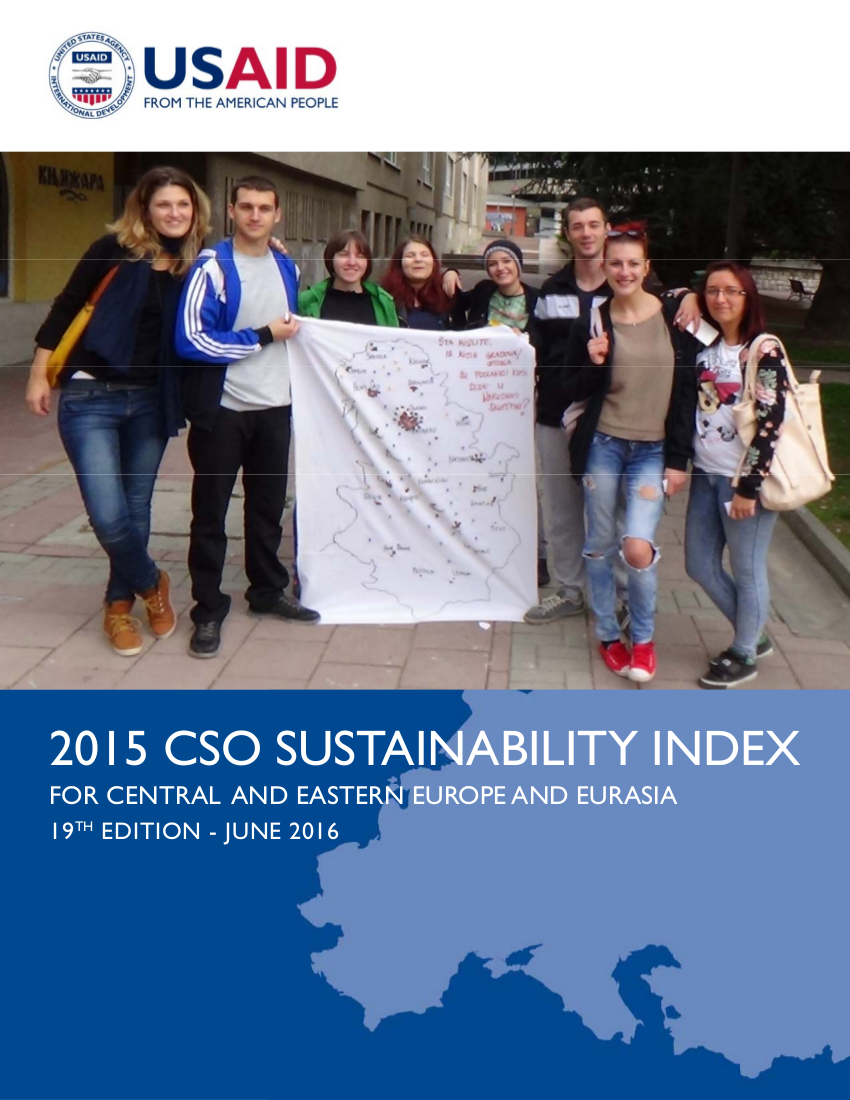- What We Do
- Agriculture and Food Security
- Democracy, Human Rights and Governance
- Democracy, Human Rights and Governance Strategy
- Supporting Free and Fair Elections
- Supporting Vibrant Civil Society & Independent Media
- Protecting Human Rights
- Promoting Accountability & Transparency
- Importance of Democracy, Human Rights, & Governance to Development
- Countering Trafficking in Persons
- Economic Growth and Trade
- Education
- Ending Extreme Poverty
- Environment and Global Climate Change
- Gender Equality and Women's Empowerment
- Global Health
- Water and Sanitation
- Working in Crises and Conflict
- U.S. Global Development Lab
CSO Sector Development In 2015
While it is clear that the transition that has been underway in Central and Eastern Europe and Eurasia for nearly a quarter century—of which the development of civil society is an integral part—is not inevitable or uni-directional, Civil Society Organizations (CSOs) are playing a key role in responding to major regional challenges. CSO sectors in the twenty-four countries covered in the CSO Sustainability Index for Central and Eastern Europe and Eurasia continue to be highly diverse in 2015, spanning the full spectrum of sustainability. The growth of truly democratic institutions and civic space has been stunted in many countries, and has eroded in others. On the other hand, as many countries continue on a path towards membership or association with the European Union, civil society is advocating for and monitoring the implementation of democratic practices and good governance reforms. Finally, 2015 was marked with the unprecedented wave of migrants and refugees entering the continent, largely from Syria and Iraq, which affected a number of dimensions of CSO sustainability. CSOs played a key role in providing services to refugees and promoting informed public dialogue on issues related to migrants, both along the main transit routes and beyond.
Background
The Civil Society Organization Sustainability Index (CSOSI) has been used since 1997 to assess the sustainability of the CSO sector. The Index has expanded considerably since its inception – it went from covering 18 countries in the Europe and Eurasia Region, to covering over 60 countries in different regions around the world. By using standard indicators and collecting data each year, the CSOSI enables users to track developments and identify trends in the CSO sector over time while allowing for cross-country and cross-region comparison. It is used by CSO advocates, development partners, and academics to assess international and regional trends in the civil society sector and to identify common obstacles impeding the sector's sustainability, such as the legal environment, organizational capacity, and financial viability.
Approach
The Index measures the sustainability of each country's CSO sector based on the CSOSI's seven dimensions: legal environment, organizational capacity, financial viability, advocacy, service provision, infrastructure, and public image. The CSOSI's local implementing partners in each country lead the process of organizing and convening a diverse and representative panel of CSO experts. Country panels discuss the seven dimensions for the year being assessed, and reach consensus on the scores corresponding to each dimension. With the information provided by the expert panel along with desk research, the CSO implementing partner then develops a narrative report.








Comment
Make a general inquiry or suggest an improvement.